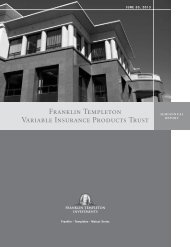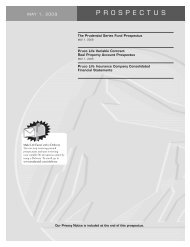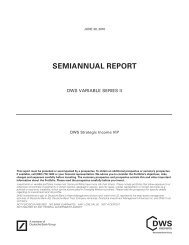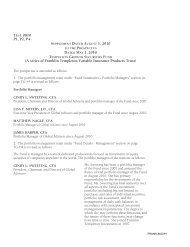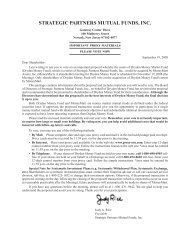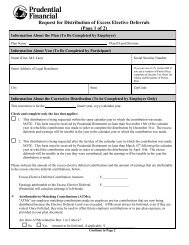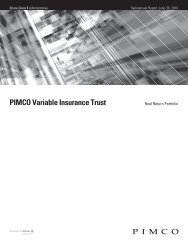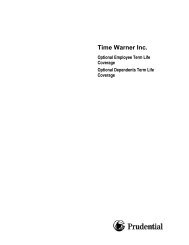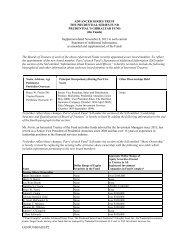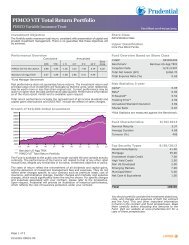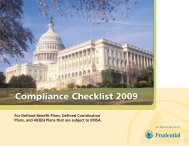Advanced Series Trust AST Academic Strategies Asset ... - Prudential
Advanced Series Trust AST Academic Strategies Asset ... - Prudential
Advanced Series Trust AST Academic Strategies Asset ... - Prudential
Create successful ePaper yourself
Turn your PDF publications into a flip-book with our unique Google optimized e-Paper software.
until the deal closes.<br />
• While most corporate deals close successfully, many investors holding a target company’s shares may<br />
choose to sell them before closing to avoid the potential for a steep loss in value if the transaction fails to<br />
close.<br />
• The discount in the value of the target company’s stock reflects the tension between (i) the likelihood of a<br />
completed transaction paying a certain amount of consideration for a target’s shares and (ii) the willingness<br />
of holders of the target’s stock to sell their stock at a discount prior to closing to lock in gains and avoid the<br />
risk of a significant loss in value of the target’s stock if the transaction does not close.<br />
The diversified arbitrage sleeve will invest in stocks of target companies in potential merger transactions based on<br />
CNH’s expected risk-adjusted return for the arbitrage transaction. In most cases, the diversified arbitrage sleeve will<br />
buy the target’s stock soon after the announcement of the merger transaction and in most cases will hold the stock<br />
until the deal is completed. While the diversified arbitrage sleeve will usually invest in the common stock of the<br />
target, it may also invest in other securities of the target such as convertible debentures, options, and bonds. The<br />
diversified arbitrage sleeve generally will invest in target firms located in the United States, but may also invest in<br />
target firms located in other countries if circumstances warrant.<br />
Convertible Arbitrage: When employing a convertible arbitrage strategy, CNH will invest in Convertible Securities<br />
trading at discounts to their fundamental values (according to proprietary models) and attempts to mitigate the<br />
various risks associated with investing in such Convertible securities.<br />
• A Convertible Security is a debenture or a preferred security that the holder may exchange into the<br />
common stock of a company at a pre-specified rate of conversion under certain circumstances. Because it<br />
offers an option to convert the security into common stock, the convertible security pays less interest or<br />
preferred dividend than any comparable non-convertible debt or preferred stock issued by the company.<br />
• Convertible Securities are a substantial source of capital for many companies, especially those with high<br />
risk, low cash flows and immediate need for funding. Convertible securities are usually sold at a discount<br />
to their fundamental value and, given their limited liquidity, normally trade at a discount in the secondary<br />
market for a lengthy period of time until they mature, are redeemed or otherwise extinguished by corporate<br />
action.<br />
• Convertible arbitrageurs (such as the diversified arbitrage sleeve) normally are the primary participants in<br />
the Convertible Securities market, and typically buy the Convertible Security and seek to mitigate the<br />
various risks associated with the security (i.e., equity risk, credit risk, and interest rate risk) by using<br />
various investment strategies. For example, equity risk may be hedged by shorting the stock of the issuer in<br />
an amount based on the sensitivity of the Convertible Security to the issuer’s stock.<br />
In most cases, the holding period for an investment by the diversified arbitrage sleeve in a convertible arbitrage trade<br />
will be longer than a year, and could be several years for some investments. The diversified arbitrage sleeve<br />
generally will hold Convertible Securities of domestic issuers, but may purchase Convertible Securities of foreign<br />
issuers if circumstances warrant.<br />
Other arbitrage strategies: CNH also may employ other arbitrage strategies, such as “when-issued trading” arbitrage,<br />
“stub-trading” arbitrage and “dual-class” arbitrage.<br />
• When-issued arbitrage takes advantage of inefficiencies in the prices at which a parent’s and subsidiary’s<br />
stock are trading on a “when-issued” basis immediately prior to the spin-off of the subsidiary.<br />
• Stub-trading arbitrage takes advantage of inefficiencies in the prices at which a stock of a publicly traded<br />
parent corporation and its publicly traded subsidiary are trading.<br />
• Dual-class arbitrage takes advantage of inefficiencies in the prices at which different classes of a publicly<br />
traded company’s stock are trading.<br />
The diversified arbitrage sleeve may employ additional arbitrage strategies as they arise.<br />
Other Types of Alternative Investment <strong>Strategies</strong> used by Arbitrage Subadvisers: CNH will also pursue other, nonarbitrage<br />
“alternative” investment strategies as it sees market opportunities to do so. For example, the diversified<br />
arbitrage sleeve expects to enter into “price pressure” trades, and may invest in or engage in trading relative to<br />
“SPACs” (special purpose acquisition vehicles), short-term debt, distressed securities, and “PIPEs” (private<br />
investments in public entities).<br />
9<br />
<strong>AST</strong>SUP2



